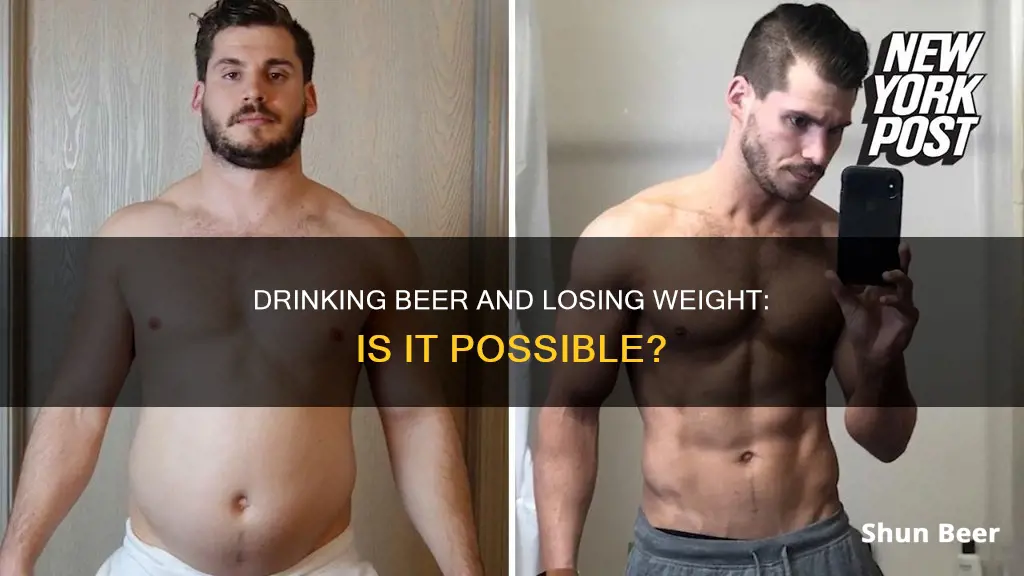
Drinking beer and losing weight are not mutually exclusive, but it is harder to lose weight if you drink beer. Beer is an empty calorie drink, providing almost no nutrients and making it easy to drink a lot of calories very quickly. Alcohol also stops the body from burning fat and can negatively impact sleep, which is linked to weight gain and muscle loss. However, drinking beer in moderation and making adjustments to your eating habits can help you lose weight. For example, drinking light or low % ABV beer, reducing portion sizes, and drinking less frequently can help you lose weight while still enjoying a beer.
What You'll Learn

Beer is an empty calorie with little nutritional value
Beer is considered an "empty calorie" food or beverage. This means that it provides a significant number of calories while offering little to no micronutrients, fibre, or protein. In other words, it has low nutrient density, meaning there are few other nutrients relative to its caloric content.
Beer is made from fermented grain, and the calories in beer come mainly from carbohydrates and alcohol. The exact number of calories and carbohydrates in beer depends on the type of brew and the amount consumed. For example, a 12-ounce can of ale, lager, porter, premium beer, or stout has more than 12 grams of carbohydrates, about four times more than a light beer.
While beer does contain some nutrients like folate, niacin, magnesium, and potassium, these are present in minimal amounts. Whole foods are far better sources of these vitamins and minerals, and the calories from alcohol do not adequately provide the nutrition that your body needs.
The lack of nutritional value in beer, coupled with its caloric content, can make it challenging to include in a balanced diet. Additionally, the liquid form of beer means that it is easy to consume a significant number of calories very quickly. As a result, drinking beer can hinder weight loss efforts, as it can contribute to excess calorie intake without providing essential nutrients.
To maintain a balanced diet, it is crucial to be mindful of the number of empty calories consumed. While beer can be enjoyed in moderation, it is important to prioritise whole foods that offer a more favourable balance of calories and essential nutrients.
Vaccinated Beer Enthusiasts: Drink Beer Post-COVID Vaccine?
You may want to see also

Alcohol disrupts sleep, which is linked to weight gain
Alcohol has been shown to negatively impact sleep, which is directly linked to weight gain. Research has found that alcohol increases the production of adenosine, a chemical in the brain that acts as a sleep-inducer, allowing people to fall asleep faster. However, this chemical quickly subsides, making it more likely for people to wake up throughout the night.
Alcohol also inhibits REM sleep, often considered the most mentally restorative phase of sleep. Additionally, drinking before bed is linked to more slow-wave sleep patterns called delta activity, while alpha activity, which indicates wakefulness with eyes closed, is turned on at the same time. Experiencing these two brain wave activities simultaneously is thought to inhibit quality rest.
A study analyzing the sleep and alcohol habits of 4,098 adults found that alcohol negatively impacted sleep quality, with heavier consumption correlating to poorer sleep. Specifically, low alcohol intake reduced sleep quality by 9.3%, moderate alcohol intake by 24%, and heavy alcohol intake by nearly 40%. The study also showed that alcohol affected men and women similarly and that it impacted the sleep of younger people more than older adults.
Therefore, while it is not necessary to give up drinking entirely to preserve quality sleep, it is important to drink responsibly and follow certain tips to ensure that alcohol does not impair sleep. These include allowing a minimum of three hours between the last drink and bedtime, drinking water along with alcohol, and avoiding alcohol close to bedtime, especially if taking sleeping pills.
Miller Beer Text Rebates: How Do They Work?
You may want to see also

Alcohol inhibits fat burning and affects metabolism
Secondly, alcohol disrupts the normal sleep cycle, reducing the quality of sleep and impairing the body's ability to form new memories and retain information. This can impact physical endurance and performance, making it more challenging to engage in healthy activities such as exercise.
Thirdly, alcohol interferes with nutrient absorption, including essential vitamins and minerals such as thiamin (vitamin B1), vitamin B12, folic acid, and zinc. Thiamin, for example, is crucial for metabolising proteins, fats, and carbohydrates, and a deficiency can impair metabolic processes.
Additionally, alcohol affects the liver, which plays a vital role in metabolic processes. Excessive alcohol consumption can lead to alcoholic fatty liver, damaging the liver and impairing its ability to metabolise and store fats and carbohydrates properly. This can result in weight gain over time.
Alcohol can also increase cravings and appetite, leading to poor food choices and increased consumption of unhealthy foods. While moderate alcohol consumption may not significantly increase cravings, it can still disrupt metabolic pathways and hinder the body's ability to burn fat efficiently.
Texas Driving: Beers, How Many Before You're Over the Limit?
You may want to see also

Beer may not be high in calories, but it can increase appetite
Firstly, beer is an "empty calorie" drink, providing almost no nutrients while still delivering a substantial calorie load. A typical 12-ounce beer contains around 100 to 150 calories, which is comparable to the calorie content of a sugary soft drink. These calories can quickly add up, especially if you're drinking multiple beers in one sitting.
Secondly, beer, like other alcoholic beverages, can increase your appetite and make you feel hungrier, even if you've just eaten a full meal. This is because alcohol suppresses the production of leptin, a hormone that inhibits hunger and makes you feel full. With lower levels of leptin, you're more likely to reach for a snack or second helping, even if your body doesn't need the extra calories. This effect is compounded by alcohol's tendency to lower inhibitions and impair judgment, making it harder to stick to healthy eating choices.
Additionally, beer can negatively impact your sleep quality. A poor night's sleep can lead to increased appetite and cravings for high-calorie, carbohydrate-dense foods the next day. Lack of quality sleep is directly linked to weight gain and muscle loss, making it even more challenging to maintain a calorie deficit and lose weight.
Lastly, beer may inhibit your self-control. When you consume alcohol, your inhibitions are lowered, and you may find yourself making food choices that you wouldn't normally make when sober. This can lead to overeating or choosing less nutritious options, both of which can hinder your weight loss progress.
To successfully lose weight while still enjoying the occasional beer, moderation and strategic planning are key. Limit your beer intake to a few beers per week, and be mindful of your eating habits on days when you drink. Opt for lean protein sources, vegetables, and whole foods, and avoid high-calorie snacks and greasy foods that can sabotage your weight loss efforts.
Beer and Eye Problems: Is There a Link?
You may want to see also

Drinking in moderation is key
Moderate drinking is typically defined as 1-2 drinks per day for men and up to one drink per day for women. A drink of beer is usually considered to be 12 fluid ounces of 5% ABV beer. However, it is important to note that craft beers tend to have a higher alcohol content and more calories per ounce than regular beers. Therefore, it is advisable to opt for light or low-ABV beers when trying to lose weight.
To effectively lose weight while still drinking beer, it is recommended to limit the number of beers consumed per week. This could mean having one beer a day or 2 beers on the weekend. Additionally, it is important to adjust eating habits based on drinking habits. For example, if having a burger with a couple of beers, choose a side salad instead of fries. Focusing on lean protein sources and vegetables when drinking beer can help promote weight loss.
Another strategy is to reduce portion sizes by using smaller glasses or choosing 12-ounce cans instead of 16-ounce bottles. Drinking less frequently, such as only on weekends, can also help create a caloric deficit. Additionally, choosing lower-carb beers can be beneficial for those cutting carbs. Some examples include Michelob Ultra, Budweiser Select 55, and Corona Premier.
It is worth noting that drinking beer can negatively impact sleep quality, which is directly linked to weight gain and muscle loss. Lack of quality sleep can increase appetite and lead to poor diet choices. Therefore, it is advisable to avoid drinking beer close to bedtime and to prioritise getting a good night's sleep.
In conclusion, while it is possible to lose weight while drinking beer, moderation is key. By limiting the number of beers consumed, adjusting eating habits, and prioritising sleep, individuals can effectively lose weight while still enjoying the occasional beer.
Enjoying Beer at Camp Nou: What's the Deal?
You may want to see also
Frequently asked questions
Yes, but it is harder to create a caloric deficit if you drink every day. Beer is an "empty calorie" because it provides almost no nutrients. It is also in liquid form, which means you can drink calories very quickly. Beer also contains alcohol, which is metabolised differently by the body compared to other macronutrients.
The best strategy is to limit the number of beers you have per week. The fewer beers you drink, the fewer empty calories you are ingesting. You could also adjust your eating habits based on your drinking habits. For example, if you are having a burger with a couple of beers, you could skip the fries.
Drink light or low % ABV beer, reduce your portion size by using a smaller glass or choosing a 12-ounce can instead of a 16-ounce bottle, and drink less frequently, such as only on weekends.
Alcohol can disrupt your sleep, mess with your appetite, and trigger a release of the neurotransmitter dopamine, which can make fatty foods seem more attractive. Alcohol can also increase fat storage and slow down your metabolism.







